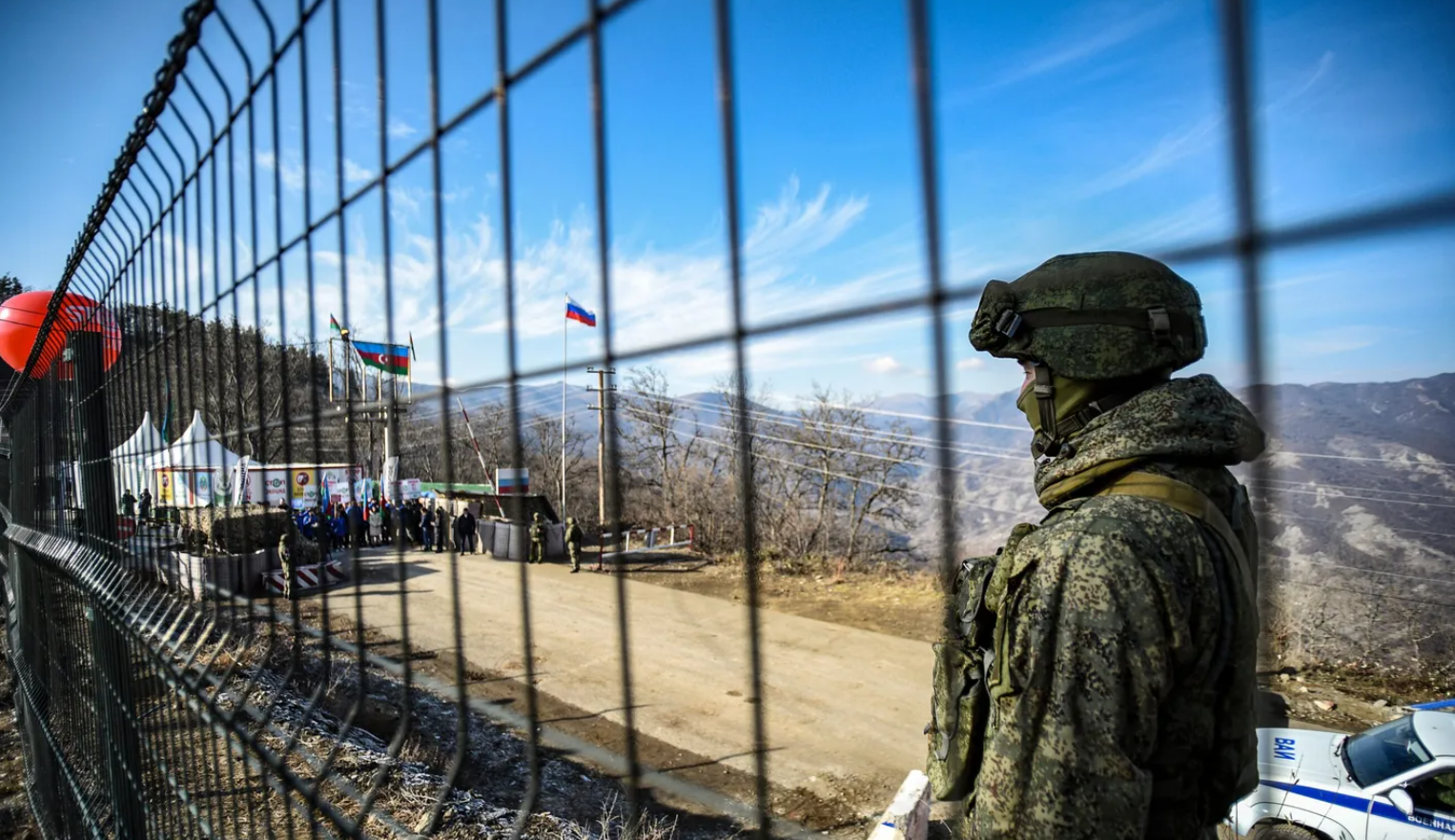A Russian peacekeeper stands guard at the Lachin Corridor (Tofik Babayev, AFP via Getty Images).
The “eco-activist” blockade of the Lachin Corridor, a vital artery into the disputed Nagorno-Karabakh region, entered its fourth week last Thursday, leaving 120,000 ethnic Armenians in the breakaway region with a scarcity of food and medicine, even as winter temperatures fell to -10 degrees Celsius (14 degrees Fahrenheit) over the weekend.
Fresh snowfall and lower temperatures kept many of the Azeri “protesters” at home on Saturday, but a small contingent remained to block the only road between Armenia and Nagorno-Karabakh, preventing civilian food and supply convoys from delivering goods to the isolated region. Azeri troops stood guard nearby. Only Russian peacekeeping convoys and Red Cross vehicles have been allowed to pass the blockade, providing minimal foodstuffs and medical supplies which are insufficient for the Armenian population of over 100,000. According to the non-profit organization Genocide Watch, the blockade fits the definition of genocide set by the UN Genocide Convention, intending to “deliberately inflict conditions of life calculated to bring about the end of a national, ethnical, racial or religious group in whole or in part.” France was reportedly leading an effort before the new year to pass a resolution in the United Nations Security Council condemning Azerbaijan’s complicity in the crisis but was blocked by Russia.
Recent analyses have shown that at least some of the “eco-activist” protesters are actually members of the Azeri military in plainclothes, adding to evidence that the “protests” are not a spontaneous, grassroots phenomenon concerned with Armenian mining in Nagorno-Karabakh, but a premeditated strategy by the Azeri government to besiege the Armenian people living in the isolated region. Nagorno-Karabakh is an Armenian-majority enclave inside Azerbaijan, which has acted autonomously since the early 1990’s and is considered by Armenians to be the independent Republic of Artsakh. More than half of Artsakh’s territory was occupied by the Azeri army in a 2020 military offensive, which was backed by Turkey. The short conflict included dozens of documented reports of war crimes against Armenian civilians, including ethnic cleansing, rape, and murder, and ended with a Russian-brokered ceasefire and a small Russian peacekeeping contingent. A key component of the Russian peacekeeping mission is the maintenance of the Lachin Corridor as a lifeline between Armenia and Nagorno-Karabakh, but so far, Russian peacekeepers have been unwilling to exercise their mandate to keep the road open. Armenian Prime Minister Nikol Pashinyan called the Russian peacekeeping contingent “a silent witness to the depopulation of the Nagorno-Karabakh region.”
Meanwhile, Armenians in Nagorno-Karabakh report an increasingly dire situation. Before the blockade that began on December 12, over 400 tons of food, medicine and other supplies arrived daily from Armenia. Shipments have now been reduced to only several truckloads per day, as the Armenian government warns that the reality of famine in the region is “tangible.” One Armenian resident reported, “Shops are empty and in the whole town, you can't find any fruit or vegetables; the same with basic medicine. It's all finished.” Another revealed that the grocery store in capital city of Stepanakert "which supplies the city, [has] been closed for some time."
We implore the Maranatha global family to intercede on behalf of the Armenian people in Nagorno-Karabakh. We pray that the brutal aggression of the Azeri government, backed by Turkey, would be restrained, and that the international community would prioritize humanitarian concerns over Western-Azeri energy deals, and would act courageously in sanctioning Azerbaijan. Most of all, we pray that the current crisis would open wide, effective doors for good news in both Armenia and Azerbaijan.
Maranatha.




